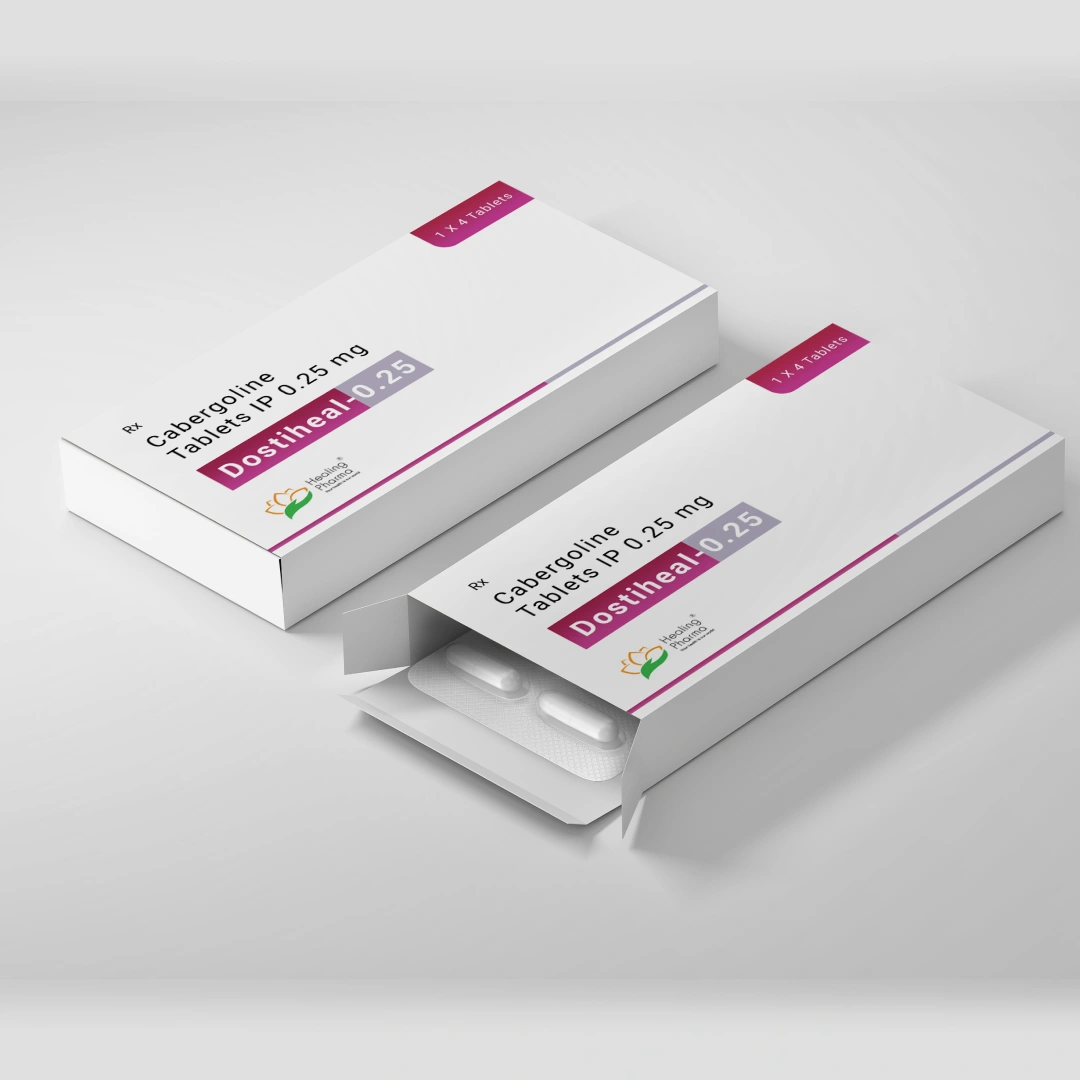Hassle Free Delivery
Dostiheal 0.25 Tablet
$100.00 – $425.00
Discreet Packaging
Safe and Affordable
How does it Work?
Dostiheal tablets contain cabergoline, known for its prolactin-reducing effect.
Prolactin is a hormone that your pituitary gland (in the brain) makes. It stimulates lactation (producing milk in the breasts). It also contributes to breast tissue development. When the levels of prolactin are too high in the body, it may lead to several health conditions e.g., irregular menstrual periods in women. High levels of prolactin can cause erectile dysfunction in men.
To reduce the extra prolactin, cabergoline binds to dopamine receptors. Dopamine stops or slows down the production of prolactin. As a result, the body produces less prolactin. Thereby treating the reproductive or hormonal problems caused by prolactin.
Uses
Recommended Dose
Side Effects
Some common side effects of Dostiheal oral tablet include:
- nausea
- unusual weakness
- constipation
- headache
- dizziness or drowsiness
Usually these effects are mild and disappear in a couple of days. If they persist or become worse, speak to your doctor straight away.
Get emergency medical help if you experience any severe side effects such as:
- difficulty breathing
- chest pain or cough that last for days
- stomach pain
- swelling of legs or arms
- irregular heartbeat
These are examples of some possible side effects. For further information, please check the medicine leaflet by manufacturer and talk to a healthcare provider.
Safety Advice
Dostiheal 0.25 Tablet is generally safe when taken as directed by a licensed physician.
Do not take Dostiheal 0.25 if you are allergic to cabergoline.
Talk to your doctor before using Dostiheal 0.25 if you have any medical condition. For instance, if you have or had in the past:
- impaired liver function
- severe heart problems (e.g., uncontrolled high blood pressure or heart valve problems)
- tissue scarring problems
- lung diseases or breathing problems
- stomach ulcer
- hypotension
If you’re pregnant or breastfeeding, talk to your healthcare provider before taking this medicine.
Limit your alcohol intake (or better avoid it) while taking cabergoline. It can increase the risk of side effects e.g., drowsiness and lack of focus.
Dostiheal 0.25 Tablet can make you feel drowsy or dizzy. Do not drive, use heavy machinery. Avoid doing anything that requires a lot of alertness or focus.
Medical Interactions
A drug interaction can occur when you take two (or more) medicines together without consulting a doctor. It increases the risk of side effects. This may also change the way a medication is intended to work. Drugs can interact with certain foods, drinks or dietary supplements.
Dostiheal 0.25 Tablet can interact with
- psychiatric medications like haloperidol, thiothixene, and prochlorperazine
- anti-nausea and anti-vomiting drugs such as metoclopramide or promethazine
It may cause extremely low blood pressure when mixed with hypertension medications.
All possible drug interactions have not been listed here. Make sure to share all products you use (e.g., prescription medications, OTC drugs, herbs or other supplements) with your doctor.
Storage
- Store Dostiheal 0.25 Tablet at room temperature.
- The medicine should not be left in warm or humid places. Do not store it in the bathroom cabinet or near a sink. Heat, air, and steam can spoil the medicine.
- Do not repack the medicine. Store it in the original packaging until you consume it.
- Place the medicines in a locked cabinet where children and pets cannot reach.
- Do not take medicines that have expired. Even if you have bought it recently, check the label. If you’ve taken expired medicines by mistake, inform your doctor.
- Discard any pills that have gone past their expiry date. Follow your local regulations and laws for their safe disposal.
Refrences
- Cabergoline. Sandwich, Kent: Pfizer Limited; 1996 [revised May 2018].[Accessed 22 Jan. 2019] (online) https://www.medicines.org.uk/emc/medicine/1479
- Cabergoiline. New York, New York: Pfizer; 2014. [Accessed 03 Apr. 2019] (online) https://www.accessdata.fda.gov/drugsatfda_docs/label/2014/020664s013lbl.pdf
- Chaves RG, Lamounier JA. Breastfeeding and maternal medications. J Pediatr (Rio J). 2004;80(5 Suppl):S189-S198. [Accessed 03 Apr. 2019] (online) https://www.scielo.br/j/jped/a/pKPFtLMX4jNH6tTtrqNwb4r/?format=pdf&lang=en
- Cabergoline [Prescribing Information]. Libertyville, IL: A-S Medication Solutions; 2023. [Accessed 12 Jun, 2023] (online) https://dailymed.nlm.nih.gov/dailymed/fda/fdaDrugXsl.cfm?setid=89ec147b-a6fe-49bb-9af5-52fc2ce5db7f&type=display
- Colao, A., Lombardi, G., & Annunziato, L. (2000). Cabergoline. Expert Opinion on Pharmacotherapy, 1(3), 555–574. https://doi.org/10.1517/14656566.1.3.555
- Rains, C.P., Bryson, H.M. & Fitton, A. Cabergoline. Drugs 49, 255–279 (1995). https://doi.org/10.2165/00003495-199549020-00009
Disclaimer
HisBlue is not a substitute for professional medical care or advice from your doctor. The health information on the HisBlue website is general and provided for your information only. We have ensured our content is accurate and current, with reviews by expert doctors. However, we cannot guarantee its accuracy or timeliness. This information is not meant to replace the diagnosis, treatment, or judgement of your doctor or another qualified healthcare provider.
Frequently Asked Questions (FAQs)






Reviews
There are no reviews yet